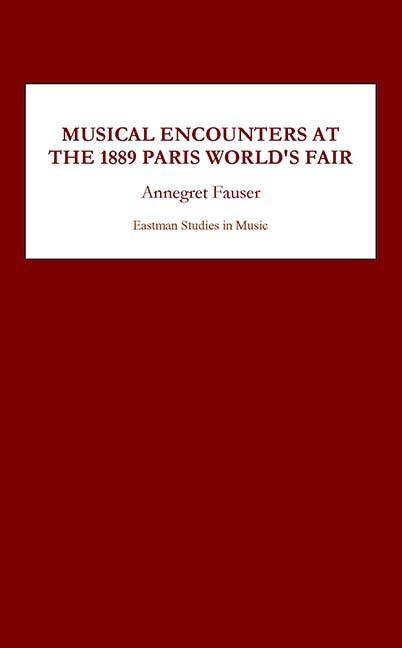Book contents
- Frontmatter
- Dedication
- Contents
- List of Figures
- List of Tables
- List of Music Examples
- Acknowledgments
- List of Abbreviations
- Introduction: The Soundscape of the 1889 Exposition Universelle
- 1 Exhibiting Music at the Exposition Universelle
- 2 Opera, Ballet, and the Politics of French Identity
- 3 The Republic’s Muse: Augusta Holmès’s Ode triomphale
- 4 French Encounters with the Far East
- 5 Belly Dancers, Gypsies, and French Peasants
- 6 The Marvels of Technology
- Appendix 1 Programs of Concerts at the Exposition Universelle
- Appendix 2 Performances at the Opéra and the Opéra-Comique during the Exposition Universelle
- Dramatis Personae
- Bibliography
- Index
- Eastman Studies in Music
- Musical Encounters at the 1889 Paris World’s Fair
2 - Opera, Ballet, and the Politics of French Identity
Published online by Cambridge University Press: 26 May 2022
- Frontmatter
- Dedication
- Contents
- List of Figures
- List of Tables
- List of Music Examples
- Acknowledgments
- List of Abbreviations
- Introduction: The Soundscape of the 1889 Exposition Universelle
- 1 Exhibiting Music at the Exposition Universelle
- 2 Opera, Ballet, and the Politics of French Identity
- 3 The Republic’s Muse: Augusta Holmès’s Ode triomphale
- 4 French Encounters with the Far East
- 5 Belly Dancers, Gypsies, and French Peasants
- 6 The Marvels of Technology
- Appendix 1 Programs of Concerts at the Exposition Universelle
- Appendix 2 Performances at the Opéra and the Opéra-Comique during the Exposition Universelle
- Dramatis Personae
- Bibliography
- Index
- Eastman Studies in Music
- Musical Encounters at the 1889 Paris World’s Fair
Summary
The organizers of the official concerts of French music for the Exposition Universelle seemed mainly preoccupied with reappropriating the French musical past for the Third Republic, with respect both to compositions and to forms of music making. The leaders of Parisian cultural and political institutions, however, looked to new works as well as old to assert France's cultural glory. Indeed, the Théâtre de l’Opéra-Comique brought out a major French première with Jules Massenet's Esclarmonde on 15 May, right at the beginning of the Exposition. This was to be the only opera première for the duration of the Fair, and thus it was all the more significant. But the Opéra-Comique also offered a series of widely advertised performances of late-eighteenth-century opéras comiques as a form of generic archaeology, as well as their regular performances of “classics” such as François-Adrien Boieldieu's La Dame blanche (1825) or Ferdinand Hérold's Le Pré aux clercs (1832). Furthermore, the hundredth performance of Edouard Lalo's Le Roi d’Ys, the previous year's major première, took place on 24 May 1889, and on 13 September there was the 400th performance at the Opéra-Comique of Georges Bizet's Carmen (1875).
In contrast to this artistic success story, the Théâtre de l’Opéra struggled for months under the embattled leadership of Eugène Ritt and Pierre Gailhard until they could finally present, on 26 June 1889, the première of Ambroise Thomas's ballet La Tempête. The rehearsals for Camille Saint-Saëns's new opera Ascanio, which was originally supposed to be the Opéra's great Exposition triumph to match the Massenet première of the Opéra-Comique, encountered mishap after mishap, and the work was not performed until almost a year later, on 21 March 1890. Thus, throughout the duration of the Exposition Universelle, the Académie Nationale de Musique did not offer a première of a new French opera, and to fill the house it had to rely instead on a ballet by the almost eighty-year-old doyen of French music and on repertoire performances of such operas as Charles Gounod's Faust (1859) and Roméo et Juliette (1867), Giacomo Meyerbeer's L’Africaine (1865) and Les Huguenots (1836), or Fromental Halévy's La Juive (1835).
- Type
- Chapter
- Information
- Musical Encounters at the 1889 Paris World's Fair , pp. 59 - 102Publisher: Boydell & BrewerPrint publication year: 2005



